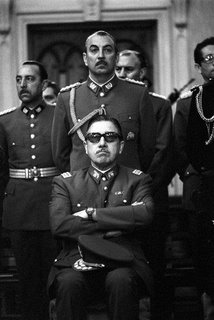
Venezuelan President Hugo Chavez has demanded an apology after Cardinal Rosalio Castillo Lara used the attendance of hundreds of thousands of people at a religious event in the city of Barquisimeto last weekend as an opportunity to stoke up opposition to the government. The Cardinal compared the democratically elected government to a dictatorship.
According to the Guardian, he said that, "almost all the branches [of government] are in the hands of just one person,".
On his weekly television show Chavez described the comments as, "Insults, hate, it was shameful for the Catholic church. It was undoubtedly a provocation."
Venezuela is a predominantly catholic country, and relations between Chavez and the church have been difficult in the past, particularly over the countries alliance with Cuba and other left wing governments.
I won't delve very deeply into the complicated question of the Church's role in Latin American politics here, but it is worth considering the power that the cardinals and bishops of the region hold, power which has mostly, though not exclusively, been used to support right wing governments and try to undermine popular support for left wing politics.
Before Cardinal Ratzinger became Pope Benedict XVI, he was instrumental (as leader of the Congregation for the Doctrine of the Faith) in the excommunication, ostracisation and in many ways the persecution of followers of Liberation Theology, accusing them of Marxist tendencies. Liberation theologians such as the Brazilian Leonardo Boff and the Peruvian Gustavo Gutierrez believe that the primary focus of the church should be to liberate the world's people from poverty and oppression. As Pope John Paul II's enforcer, Ratzinger made sure that independent voices in the church were silenced whenever possible and forward- thinking Bishops were replaced.
After Ratzinger became pope, Chilean Cardinal Angello Sodano succeeded him to become Dean of the College of Cardinals, and he holds this post simultaneously with the post of Vatican Secretary of State, which Ratzinger reappointed him to, making him the Pope's right hand man.
Sodano is an extraordinarily controversial figure. He is at the extreme right of the church, and was a close ally of the brutal dictator General Augusto Pinochet. When Pinochet was in power he held the position of Papal Nuncio (Vatican's Ambassador) to Chile, and devoloped a close friendship and working relationship with the dictator, endevouring on his behalf with great success to secure Vatican support for the regime, even managing to arrange a Papal visit to Chile. When Pope John Paul II visited the country, he and the 'exemplary christian' Pinochet stood on a balcony together to recieve the cheers of the crowds.
In Novemeber 1998 he interceded on the General's behalf to try to prevent him from being extradited from England to Spain to face trial for some of the numerous crimes committed by his regime (incidently, former British Prime Minister Margaret Thatcher, who considered Pinochet "a friend of Britain", was among his most vocal supporters at the time-she entertained the dictator at her home a couple of days berfore the arrest).
Other friends to have benifited from Sodano's friendship include the founder of the Legion of Christ order in Mexico, Marcial Marciel, who met Sodano in the 1970's when Marciel was helping to drum up support for the dictator. The Los Angeles Times recently reported on a major cover-up by Ratzinger and Sodano of several sex abuse allegations levied against Marciel.
On the other hand, the President of Brazil's Roman Catholic Bishop's Conference recently attacked the government of Lula De Silva for not doing enough to help the millions of Brazilians who live in poverty, and for seeking to pay off its debt to foreign creditors before addressing the needs of the poor.
"Cardinal Geraldo Majella Agnelo of Sao Salvador da Bahia said that 2005 was "wasted" by President Luiz Inacio Lula de Silva, whose government promised to help the poor but has been mired in scandal.
"I sincerely hope that 2006 will be the year of redemption for the government and programs that directly benefit the extremely poor," Agnelo said."
Whether opposing or supporting governments in Latin America, the church is a hugely influential force, and it will be interesting to see how the church adapts itself to the new left-wing movements sweeping the region.


No comments:
Post a Comment